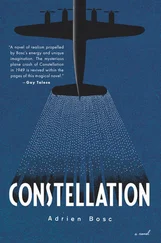“Yes, sir.”
“Then give me names, Ramzan.”
“Yes, sir.”
“Or I’ll sew your stones back on just to chop them off twice.”
The Landfill filtration camp was so named for having been built, or rather sunken, into the site of a partially constructed garbage dump. Once, when Ramzan passed the site as a younger man, he watched a brontosaurial backhoe bite into the soil and scoop out a bathtub’s worth of loose earth. But after the collapse, and the subsequent wars, plans to finish the landfill were postponed then abandoned completely. Only two of the eight proposed pits, each twenty meters deep, with the surface area of a soccer field, had been excavated. The concrete and plastic foundation, which would have trapped runoff effluvia, was never installed, and so rain and snow dissolved into a knee-deep sludge at the bottom of the two earthen pits. When Ramzan was taken there in the first war, he spent three days in Pit A before two guards lowered a sixty-rung ladder, doused his feet and legs in frigid water, and led him to the two-story white building whose entranceway still bore the sign REFUSE DISPOSAL ADMINISTRATION. Petitions calling to fill in the pits circulated after the first war. An unfortunate group of sixteen women widowed by the Landfill shoveled for a month, but failed to visibly alter the swampscape. Ultimately, the symbolic benefit of filling the two pits didn’t hold up to the actual benefit of rebuilding roads, houses, schools, power plants, refineries, and hospitals. No one imagined the pits might again be used. No one imagined there would be a second war.
But there was a second war, and now, in January 2003, having encountered the lost Federal patrol, Ramzan was imprisoned for the second time. He spent eleven days belowground, this time in Pit B, while Dokka was taken to Pit A. At the very least his ears would receive a welcome rest. He descended the now-rusty sixty-rung ladder and the guard shook him from it before he reached the final rungs. The sludge had frozen to a snowy dampness that only reached his ankles. The pit held two dozen others. Over the coming days, he would pray to the sky with them all, but only his conversations with the blue-eyed imam would remain etched in his memory. The guards lowered food and fresh water in tin pails attached to yellow cords that came irregularly, sometimes five in a day, sometimes one, sometimes in the middle of the night when the men would wake, gather, and divide the provisions. The one thing the pit had no shortage of was space. Ramzan spent the daylight hours walking alongside its walls, wondering if somewhere the Feds had a modern prison, with electricity, bunks, cells, and roofs, in which they housed not prisoners but banana peels, and potato skins, and broken shoelaces, and apple cores, and last year’s calendars, and deflated tires, and balled-up paper, and used tissues, and cigarette butts, and the last worthless slivers of bar soap. Some compassionate guard, whose soul the imam would teach Ramzan to honor, had tossed in thin wooden planks, and a sidewalk the width of a balance beam stretched around the pit’s perimeter. The names and villages of captives were carved into the clay walls. Men packed snow on the walls as far up as they could reach to moisten the clay, and after a few minutes scraped it off and identified themselves in block letters drawn by stick or finger. Information the Feds would torture them for was written here on the walls for all to see. It was well understood among the men that the Feds had as much sense as two bricks smashed together. It was also understood that pain, rather than information, was the true purpose of interrogation.
In the afternoon of the fourth day, Ramzan balanced on the slender sidewalk when the blue-eyed imam stopped him.
“Give me a boost,” the imam asked, nodding his bearded chin toward the wall where he had written half his name. At first, Ramzan refused. Since arriving he had done his best to keep his distance from the filthy, brutalized men, as though his refusal to acknowledge them were the tightrope he walked upon, saving him from falling into their ranks.
“Are you a general, hmm?” the imam asked. “Or a Persian prince? Are your hands too delicate to help an imam old enough to be your uncle?”
“I’m not a Persian prince.”
“Then climb down from your throne and help me.”
The imam placed his muddy boot in the stirrup of Ramzan’s woven fingers. He hoisted the imam, whose weight, held in Ramzan’s straining hands, was greater than his size suggested. After an endless moment, the imam tapped him on the forehead with a muddy finger and Ramzan let the old man drop to the ground.
“Take a good look at it,” the imam said, pointing to his name and village. “If it turns out you are a Persian prince, and they let you leave, you must remember me.”
“If they let me leave, I will forget everything here.”
“No,” the imam protested, wagging his muddy little finger at Ramzan. “You must remember.”
“Why?”
“So that my nephews will know where to buy my corpse.”
Ramzan nodded.
“I can afford it, you know,” the imam said, proudly. “I still have my retirement account.”
When Ramzan turned, the imam asked, “What did they get you for?”
“Smuggling weapons. You?”
“Height.”
“Height?”
“Well, the lack of height. The Feds came to my village for a counter-terrorist operation. They were looking for some Wahhabi mastermind that was supposedly hiding there, but their only physical description of the man was that he had a beard and was less than two meters tall. They rounded up every short, bearded man, and many adolescents who didn’t have beards but met the height description. On the reason-for-arrest line of my report, they wrote too short .” The imam shook his head and stared up at his name written in the clay wall, now beyond his reach. Ramzan was glad he’d stopped to lift the imam.
“It’s funny,” the imam continued. “My generation grew up in the Kazakh resettlement camps, and because protein was so scarce, it’s not at all uncommon for men of my age to be short, but I’ve always been ashamed of it. My younger brother used to tell me that my shortness wouldn’t kill me. He was only two centimeters taller than me, but I swear, he lived his entire life in those two centimeters, lording them over me, always asking if I needed help reaching the upper shelves. I wish he were still alive, just so the Feds could arrest him for being too short, too.”
“What can one do?” Ramzan said, shrugging.
“Pray,” the imam said.
The imam held court in the southwest corner of Pit B, perched on the seat of honor, an upturned water pail that had come loose from its cord. Each morning he led prayers and performed ablutions with snow that turned his hands a numb white. He insisted that God, in His mercy, would forgive their unclean state. He had memorized the entire Qur’an and lectured on the nature of evil, which, like a shadow, cannot exist independently of the good it silhouettes. Unlike the sheikh and mujahideen, he never tied politics to Qur’anic verse, and instead explained the righteousness of the faithful and the wisdom of the Prophet and the joyousness of a Paradise that is the summer to the winter of the world. Above all, he spoke of the end times and God’s judgment.
But the interrogator would judge Ramzan before God would, and it was the interrogator’s judgment that he feared. Each day he watched the ritual of men called forth. First the sixty-rung ladder was slid down the wall of the pit, and then the name of the summoned was magnified through a bullhorn speaker, so loud and static-laced it sounded like it truly came from the heavens. If the summoned hesitated, a warning shot was fired. The summoned climbed all sixty rungs to the sixty-first, street level, a place so distant the sky seemed closer. None of the summoned returned. An optimistic man might believe they had been found innocent, released, sent home to their families; but not even Dokka, in whatever comparable perdition he lived, would be capable of such optimism. As soon as the summoned reached the top of the ladder and stepped onto the snowy soil of the sixty-first rung, the imam began the funeral. The service was unlike any Ramzan had attended. No body. No shroud. No friend or neighbor who had known the summoned in any but this desperate condition. They were all dead, just a step or two behind the summoned, and they honored him not as one who departs, but as one who has fully entered. The imam congregated the others around the damp plaque where the summoned had written his name and village. They read the name aloud, softly at first, then growing to a chant that rivaled the zikr , and made prayer from the name and sent it skyward. For twenty-four hours, or as close as they could calculate, the name and village of the summoned was left on the clay wall. At the twenty-fifth, the men gathered around the inscription. Each took a palmful of earth from the thawing ground and pressed it to the wall. Without the body, they could only bury the name, and when they could no longer read it, they knew the man was gone.
Читать дальше











